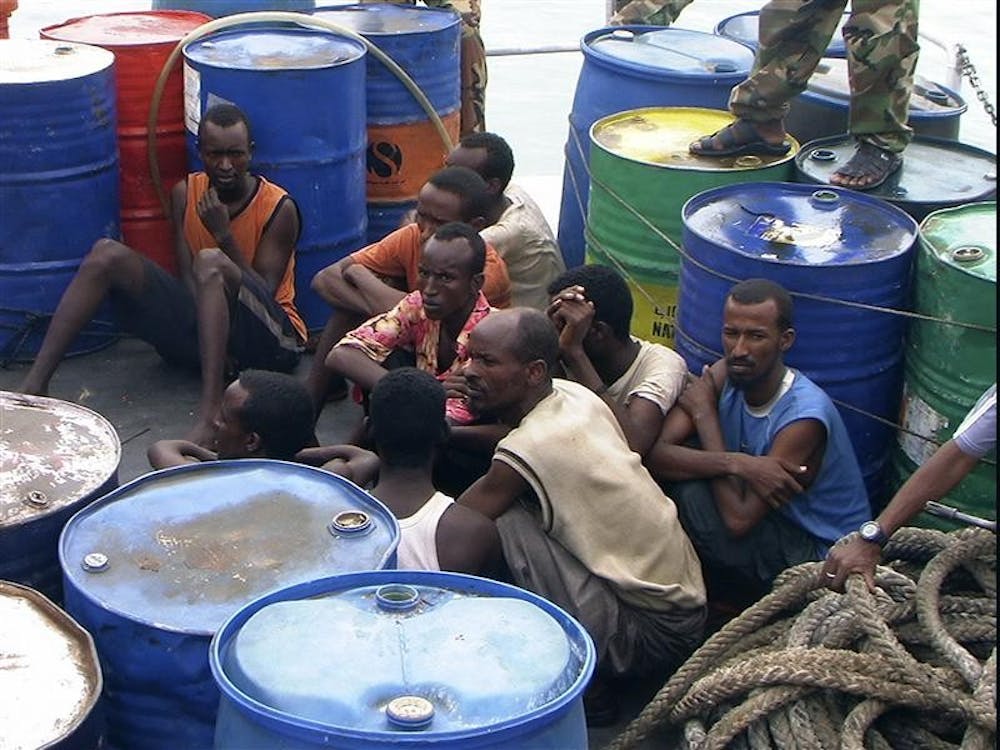NAIROBI, Kenya — They've been described as "noble heroes" by sympathetic Somalis, denounced as criminals by critics. But the adjective most used to describe the men holding an American captain off the Horn of Africa is "pirate" — a word that conjures images of sword-wielding swashbucklers romanticized by Hollywood.
The 21st century reality, though, is a far cry from that. There are no treasure-laden islands or Blackbeards in this part of the world, no wooden schooners flying skull and crossbones flags.
Instead: a vigilante movement that years ago tried to defend Somali shores morphed into full-blown pirate scourge — after fishermen on defense stumbled upon an astoundingly lucrative bounty waiting to be had on their doorstep: around 25,000 ships, most unarmed, transiting the Gulf of Aden each year.
Picture ragged Somali fishermen armed with rocket launchers, GPS systems and satellite phones. Picture tiny skiffs cruising the coast of a war-infested nation crawling with gunmen. Picture bandits with sunglasses in worn shirts firing machine-guns at cruise ships, scampering aboard captured trawlers with crude ladders.
And most of all, picture ransoms, huge ransoms.
"I think when most people think of pirates, they think of Johnny Depp and the Pirates of the Caribbean," said security consultant Crispian Cuss of the London-based Olive Group. But these guys are "just fishermen paid to act as pirates by warlords and armed gangs who have taken over a lawless state."
The plight of an American captain, seized from the U.S.-flagged Maersk Alabama and held by Somali pirates since Wednesday on a drifting lifeboat out of fuel, is only one of the latest examples of a problem that has plagued the region for years.
The American, Capt. Richard Phillips, Underhill, Vt., is believed to have been the first U.S. citizen taken by pirates since 1804, when U.S. Navy Commodore Stephen Decatur battled the infamous Barbary pirates off the northern coast of what is now Libya, dispatching U.S. Marines to the shores of Tripoli.
The modern piracy scourge in the Horn of Africa arose from the ashes of Somalia's government, overthrown in 1991.
Since then, Somalia has suffered nearly 20 years of anarchy, chaotically ruled by rival clans backed by pickup trucks mounted with anti-aircraft guns. Its nominal government controls barely a few blocks.
With no coast guard to defend its shores, Somalis began complaining that vessels from Asia and Europe were dumping toxic waste in their waters and illegally scooping up red snapper, barracuda and tuna. The rampant illegal fishing began destroying the livelihoods of local fishermen.
According to a memo prepared last month by the staff of the U.S. House Armed Services Committee, Somali clans began resorting "to armed gangs in an attempt to stop the foreign vessels. Over time, these gangs have evolved into hijacking commercial vessels for ransom as an alternative source of income."
Attacks in the Gulf of Aden and along Somalia's coast have risen dramatically, from 41 in 2007 to 111 in 2008, according to the International Maritime Bureau. Since January, pirates have staged at least 66 assaults and currently hold more than a dozen ships and more than 200 foreign crew members.
According to the House memo, pirates operating off Somalia earned $30 million in ransom through the seizure of 42 vessels in 2008. Other estimates put the figure at $80 million.
The memo cited one captured pirate as saying pirates only take 30 percent of ransoms — on average $1 million to $2 million per boat.
Twenty percent goes to group bosses, 30 percent is spent on bribing local officials, and 20 percent goes for capital investment like guns, ammunition, fuel, food, cigarettes. (Cuss said pirates were becoming more sophisticated and in the last two months have, for the first time, begun launching nighttime attacks, possibly indicating pirates have obtained night-vision goggles).
U.S. officials have found no direct ties between East African pirates and terror groups, but the illegal trade is believed backed by an international network of Somali expatriates who offer funds, equipment and information in exchange for a cut of ransoms.
The House memo said Somali buccaneers operate in five well-organized groups, drawing members from large clans, which are extended family networks. Cuss said the industry is controlled by "warlords and criminal gangs who recruit local fishermen and take a lion's share of the profits."
Andrew Mwangura of the Mombasa-based East African Seafarers' Assistance Program described the pirates as "desperate people taking desperate measures to earn a living."
Today, they number around 1,500, up from around 100 five to seven years ago, Mwangura said.
"They're earning a lot of money and everyone wants to join," Mwangura said. "They're getting new recruits every day."
On the ground in Somalia, some pirates are seen as "flamboyant middle aged men," said Mahad Shiekh Madar, a car salesman living in the northeastern port town of Bossaso on the tip of Africa's horn. "They always travel in beautiful four-wheel-drive luxury cars and look like people who are working for a big business company."
Abdulahi Salad, a 43-year-old former pirate in central coastal village of Gaan, said pirates were "different from the ordinary gunmen in Somalia. They are not thin, and they have bright faces and are always happy."
Indeed, they are often regaled for bringing wads of cash into impoverished communities.
A local elder in Gaan, Haji Muqtar Ahmed, said "being a pirate is not shame ... it is believed to be a noble profession."
Ahmed said people there used to make a living fishing, "but now the only livelihood they have is the income from the piracy."
Somali pirates a far cry from buccaneers of old

Get stories like this in your inbox
Subscribe


